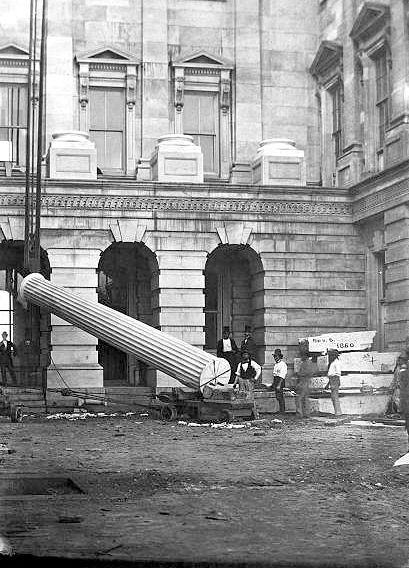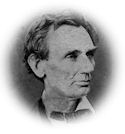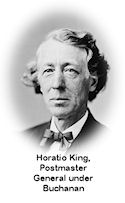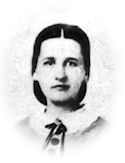Politics in Eighteen Hundred and Sixty
OUR young friend of the diary is not going to school this summer; the days are long and hot and the political fight which is on is much hotter than the weather.
Two years before this time Mr. Hopkins, the “Uncle Arvah” of the diary, had brought from his old home, Ithica, New York, a nephew who wished to come South and engage in business. Mr. Hopkins was par excellence, the merchant prince of Tallahassee; his income was large and his heart was ever open to the call of any who wished assistance. He carried a stock of goods which in richness and elegance surpassed anything ever seen in Tallahassee before or since. His home “Goodwood” was a model of beauty and comfort and was the centre of all social activities. Mrs. Hopkins was the youngest daughter of Governor John Branch and had been a belle in Washington society. She had a delightful voice and was an accomplished performer on the piano, the harp and the guitar. Her husband had a splendid baritone voice and the music they made was worth going far to hear.
This young nephew they brought south was fresh from the typical small farm of the North. He had a part to play in the life of that farm and the change, to him, was great. He entered the store of A. Hopkins & Co., and under the tutelage of his accomplished relatives he took on a polish which was more than “skin deep.” Polite, accommodating, always on the lookout for an opportunity to serve, he soon became a general favorite. You will hear more of him later on.
Storm clouds hung heavy over our land and yet we did not realize to what we were drifting. The year of Eighteen Hundred and Sixty was a most momentous year—it held in its grasp the fate of the Nation—it behooved the people of this great country to gather their wits about them, to move slowly and with caution, to bear, with patience the recriminations which continually passed between the two sections. To hold fast to that Constitution, which, at its first conception, had threatened to be drawn up in blood of the people, who it seemed at first, were unable to agree to the provisions of this, the greatest political document ever known to the world. Now an insistant voice from the Northland, ever increasing in volume, sought to set aside this Constitution; to install in its place a “Higher Law.”
The advocates of this higher law did not seem, themselves to know just what it was they were insisting upon. Freedom for the negro came first; freedom from matrimonial bonds; then freedom from the constraint laid by the Holy Bible upon the passions of human-kind. The Commandments were relegated to the background; the rights secured by the Constitution to all citizens of this great and growing nation, were set aside and a wholesale system of stealing was inaugurated in the effort to bring about negro freedom.
These slaves had been bought and paid for by the Southern planters; often these slaves had been bought from Northern owners, who felt no qualms of conscience in accepting from his Southern brother the full value of the aforesaid slaves. The stealing of his property naturally roused the ire of the owner. It is our belief that if the United States had offered a fair price for these slaves and fixed the time for freeing them in such a manner as to make it gradual, in this way each slave as he reached the age of twenty-five to be automatically free, nine-tenths of the Southern slave-holders would have been glad to accept. The life of the master, and more especially the mistress of slaves was not an enviable position. It entailed great responsibility; it brought with it many cares; there was a certain pleasure accompanying the cares, to be sure. It was a pleasure to look around on a well-ordered plantation, on healthy, happy laborers whom we loved and who returned that love; to see little children, with their engaging ways and to pet them as we would so many playful kittens, only with a deeper feeling; for white children are not the only children who are interesting.
Naturally the Southerner did not relish the idea of having his property stolen. This campaign of 186o came on a people heated almost to the boiling point by Harriet Beecher Stowe and other writers of that ilk. At the North a fanatical determination to carry their point; at the South an equally firm determination to stand up for State’s Rights and to abide by the Constitution of our fathers.
It was like two brothers who held different views and each, feeling he was right, held fast his determination. Rapidly the months passed. At the Democratic Convention in Charleston, South Carolina, the ultra Southern ticket was nomiated; Breckinridge and Lane were the candidates. In Richmond, Va., another Convention was held; this did not accomplish much and still another was held in Baltimore. The Democratic party after its usual manner failed to agree and the result was two, or perhaps you might say three tickets in the field. The pity of it! For now defeat stared them in the face. The Republican party nominated as their candidates Abraham Lincoln and Hannibal Hamlin and though, at first their chances were slim enough, the stubborn stand made by the Democratic party, virtually gave to the “black Republicans” the victory.
Never before, not even in the days of “Tippecanoe and Tyler too” was there so much excitement and unrepressed ill-feeling. Breckinridge and Lane were the most popular of the candidates put forward by the Democrats. Stephen A. Douglass and Herschel V. Johnston, former Governor of Georgia, were more conservative and were not so enthusiastically greeted in the running. John Bell, of Tennessee, was not, strictly speaking, a Whig, Edward Everett, of Massachusetts, was his mate on the ticket. There were some Old Line Whigs, who were not satisfied with these, but nevertheless they voted the ticket when the election took place.
At the North the excitement was great also. The conservative element saw danger ahead; the Northern Democrats had an intense jealousy of their Southern brethren; the Republicans (the black Republicans) were true to their name and harped continually on the one string of negro freedom. Lincoln at first, expressed himself freely as being opposed to this, but later he found it more expedient to lull conscience to sleep and adopt the views of those who had brought him into the limelight.
So the situation rested. The straight-out Democrats stood for State’s Rights and the Constitution of our fathers, the negro meant little or nothing to them. The conservative Democrats were more prudent; they saw probable loss in the event of a split in the Union, none of them really believed war would be the outcome. This loss, in their minds would, in the event of secession, confine slavery to strictly southern territory and thus it could never spread. The Whigs, too, were conservative and slow. To them, secession was obnoxious and they fought it bitterly to the end. Not, however, after it was un fait accompli then with one accord every true son of the South, casting politics to the winds, cast in his fortunes with his state and later with the Confederacy, and the result was the finest body of soldiery the sun ever shone upon. But all this came later.
The die was cast, the election was over and the black Republicans would come into power the succeeding March. South Carolina spoke up at once to express her sentiments. She hoisted the banner of a palmetto with a coiled rattlesnake and the motto: “Don’t tread on me,” and we who knew South Carolina fully recognized the fact that she was dangerous.
Florida was wild to follow South Carolina’s lead; Mississippi was just as ready and the other states had the question under discussion. The Legislature of South Carolina was in session when Lincoln was declared elected and they promptly called a convention to discuss the situation.



![Hon. Abraham Lincoln, Born in Kentucky, February 12, 1809. -- [Photographed by Brady] Harper's Weekly Front Page, 11-10-1860 Hon. Abraham Lincoln, Born in Kentucky, February 12, 1809. -- [Photographed by Brady] Harper's Weekly Front Page, 11-10-1860](https://dotcw.com/wp-content/uploads/2010/11/image_thumb3.png)







